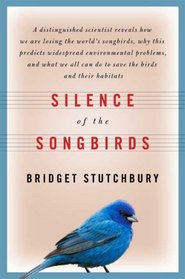Search -
Silence of the Songbirds
Silence of the Songbirds
Author:
A distinguished scientist reveals how we are losing the world?s songbirds, why this predicts widespread environmental problems, and what we can do to save the birds and their habitats. Wood thrush, bobolinks, the Eastern kingbird—migratory songbirds are disappearing at a frightening rate. Following the birds on their six-thousand-mil... more »
Author:
A distinguished scientist reveals how we are losing the world?s songbirds, why this predicts widespread environmental problems, and what we can do to save the birds and their habitats. Wood thrush, bobolinks, the Eastern kingbird—migratory songbirds are disappearing at a frightening rate. Following the birds on their six-thousand-mil... more »
ISBN-13: 9780802716910
ISBN-10: 0802716911
Publication Date: 3/3/2009
Pages: 272
Edition: Reprint
Rating: ?
ISBN-10: 0802716911
Publication Date: 3/3/2009
Pages: 272
Edition: Reprint
Rating: ?
0 stars, based on 0 rating
Genres:
- Science & Math >> Biological Sciences >> Zoology >> General
- Science & Math >> Biological Sciences >> Zoology >> Ornithology
- Science & Math >> Nature & Ecology >> General
- Outdoors & Nature >> Environment >> Conservation
- Outdoors & Nature >> Birdwatching >> General
- Outdoors & Nature >> Conservation >> General
- Outdoors & Nature >> Reference




